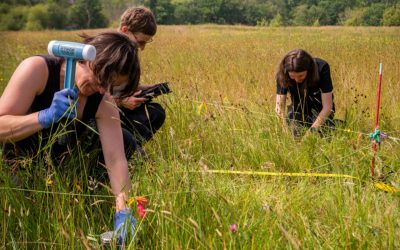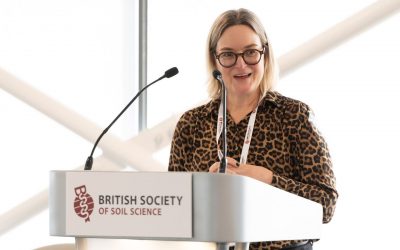As 2021 draws to a close, it is time to reflect on the Society’s achievements this year.
Our activities and initiatives have meant that our strength in numbers continue to grow, with our highest number of individual members for many years, 850 at the last count (a 15% increase from this time last year) alongside our first three Corporate Members of the Society. This growth, combined with the positive feedback from our member survey, demonstrates that the Society’s direction of travel is meeting members’ needs.
Although we will publish our Annual Report in spring 2022, which will set out all of our key achievements during the year, we are now collecting data which allows us to report on how we are meeting our mission to halt and repair soil degradation through knowledge-sharing.
We now know that our improved and tailored activities are having a better than anticipated impact, proving the value of the activities we are undertaking on behalf of our members:
- Our virtual Annual Conference was attended by over 120 delegates with 97% rating the speakers and their content as good or excellent and with 98% reporting that they had learnt something new as a result.
- The Early Careers Conference, which took place over three days and featured a number of oral and poster presentations and keynote sessions from Dr Binoy Sarkar, Professor Mark Fitzsimons, Dr Olaf Schmidt, Dr Helen Simpson and Phoebe Weston, an environmental journalist at The Guardian, was rated as very good or excellent by 100% of attendees.
- We have so far delivered ten Zoom into Soil sessions on topics as wide-reaching as the cultural aspects of soil (hosted by two artist colleagues) and Environmental Impact Assessments, a joint webinar with the Institute of Environmental Sciences. In our Soil Compaction session, 67% of attendees indicated that they would use the knowledge learnt as a result of the session in their future work.
- Our Editors have led our Soil Use and Management and European Journal of Soil Science journals to achieve increased Impact Factors: demonstrating the value members and external audiences place on the content within both publications.
In early November, we also launched our Science Note: Soil Carbon, bringing together our members’ expertise to provide a clear, comprehensive overview of the science on soil carbon and setting out our recommendations based on the current science. This is a game-changer for the Society and clearly establishes our collective expertise and independence to governments, stakeholders and lay-people.
Finally, in November the Society was awarded permanent Observer Status to the UN Climate Change Conference and related calls for evidence. This is a huge achievement for the Society – providing us with access to international decision makers, and the opportunity to submit evidence to the UN committee tackling what is arguably the biggest challenge humanity is facing.
We continue to take your feedback on board to make sure the Society continues to change and adapt, and our member survey doesn’t just share the good, we also share the areas you have identified we need to improve. Here you will see that we have also set out what we plan to do in response to your feedback and ensure the Society continues to offer membership which suits the needs of current and future members.
In early 2022, we will be sharing more detail around the Society’s strategic plan for the year ahead. The World Congress of Soil Science, which has attracted 1,900 abstracts, will be our key deliverable, however there will continue to be a range of other activities which will support the Congress and lead to lasting legacies from the event. Watch out for my blog in the new year with further information.
I would like to finish by thanking all of our volunteers: Board, Council and Committee members for their support over the last 12 months. Without their continued enthusiasm and energy, we would not have been able to deliver the amount of quality activities over the course of this year.





